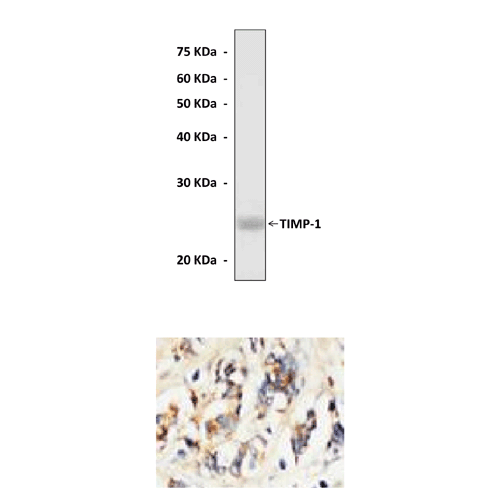Product Sheet CA0575
Description
BACKGROUND TIMP-1 is a 28.5 kDa glycoprotein that forms non-covalent 1:1 stoichiometric complexes with MMPs, thereby inhibiting the proteolytic activity of these enzymes. It is a member of the TIMP family, currently comprising four members (TIMP-1, -2, 3- and -4), which exhibit approximately 50% sequence similarity, is expressed by a wide range of cells and is present in most tissues and body fluids.1 Common to all members of the TIMP family is the presence of 12 cysteine residues in conserved regions forming six disulfide bonds that fold the protein into a two-domain structure. The presence of a large number of disulfide bonds renders the TIMP molecules resistant to extremes of temperature and pH, and denaturing conditions. High levels of TIMP-1 mRNA as well as TIMP-1 protein have been demonstrated in several types of cancer, including breast cancer, and this has been associated with a poor prognosis of the patients.2 The association between high levels of protease inhibitor and poor prognosis may be somewhat surprising, as proteolytic activity plays a pivotal role in cancer cell invasion and metastasis. This paradox points to TIMP-1 as a multifunctional protein, which in addition to the MMP-inhibitory effect has distinct tumor-promoting functions. It has been shown that TIMP-1 can mediate growth promotion and anti-apoptotic effects as well as both anti- and pro-angiogenic functions.3
REFERENCES
1. Gomez, D.E.: Eur J Cell Biol. 74:111-22, 1997
2. Gardner, J. & Ghorpade, A.: J. Neurosci. Res. 74:801-6, 2003
3. Rhee, J-S. et al: Cancer Res. 64:952-61, 2004
2. Gardner, J. & Ghorpade, A.: J. Neurosci. Res. 74:801-6, 2003
3. Rhee, J-S. et al: Cancer Res. 64:952-61, 2004
Products are for research use only. They are not intended for human, animal, or diagnostic applications.
Details
Cat.No.: | CA0575 |
Antigen: | C-terminal sequence of human TIMP-1 |
Isotype: | Affinity-purified rabbit polyclonal IgG |
Species & predicted species cross- reactivity ( ): | Human, Rat, Mouse |
Applications & Suggested starting dilutions:* | WB 1:500 - 1:1000 IP n/d IHC (Paraffin) 1:50 - 1:200 ICC n/d FACS n/d |
Predicted Molecular Weight of protein: | 24 kDa |
Specificity/Sensitivity: | Anti-TIMP-1 reacts specifically with TIMP-1 of human, mouse & rat origin in immunohistochemistry and western blotting procedures, no cross-reactivity with other members of the TIMP family. |
Storage: | Store at 4° C for frequent use; at -20° C for at least one year. |
*Optimal working dilutions must be determined by end user.
Products
| Product | Size | CAT.# | Price | Quantity |
|---|---|---|---|---|
| Polyclonal Tissue Inhibitors of Metalloproteinases-1 Antibody: Polyclonal Tissue Inhibitors of Metalloproteinases-1 Antibody | Size: 100 ul | CAT.#: CA0575 | Price: $375.00 |
Resources/Documents
Publications
2012
Stilley, J., and K. Sharpe-Timms. 2012. TIMP1 Contributes to Ovarian Anomalies in Both an MMP-Dependent and -Independent Manner in a Rat Model. Biol Reprod, 86: doi: 10.1095/biolreprod.111.094680.
2010
Stilley, J., J. Birt, S. Nagel, M. Sutovsky, P. Sutovsky, and K. Sharpe-Timms. 2010. Neutralizing TIMP1 Restores Fecundity in a Rat Model of Endometriosis and Treating Control Rats with TIMP1 Causes Anomalies in Ovarian Function and Embryo Development. Biology of Reproduction, 83:185-194.
2009
Stilley, J., R. Woods-Marshall, M. Sutovsky, P. Sutovsky, and K. Sharpe-Timms. 2009. Reduced Fecundity in Female Rats with Surgically Induced Endometriosis and in Their Daughters: A Potential Role for Tissue Inhibitors of Metalloproteinase 1. Biology of Reproduction, 80:649-656.

